Driving strategic execution at scale is hard. Organizations are under constant pressure to deliver complex initiatives on time, optimize their resources, and adapt to shifting business conditions, all while aligning teams across multiple departments and geographies. Without the right people, technology, and project management methodologies, even the most well-intentioned projects are at risk.
This article compiles the latest project management statistics, offering a data-backed perspective on how companies manage their initiatives in 2025. From the rise of AI and hybrid project methodologies to persistent execution challenges, these insights highlight what’s working and what’s not.
Get StartedProject management software market growth
The project management software market is expected to experience significant growth in the coming years. By 2025, the market size is estimated at $7.24 billion, according to global market research and consulting firm Mordor Intelligence. Additionally, the market is predicted to reach $12.02 billion by 2030, demonstrating a compound annual growth rate (CAGR) of 10.67% during the forecast period.
This highlights the increasing adoption of project management tools as organizations prioritize team collaboration and streamlined workflows to achieve key objectives. Here are some additional project management software statistics, revealed in monday.com’s world of work report:
- 82% of companies use work and project management software to drive organizational efficiencies (monday.com, 2025)
- 57% of employees report that the number of tools they use has increased compared to the previous year (monday.com, 2025)
- Smaller businesses are 13% more likely to adopt project tools than enterprise companies, proving noteworthy differences in digital PM software usage according to business size. (monday.com, 2025)
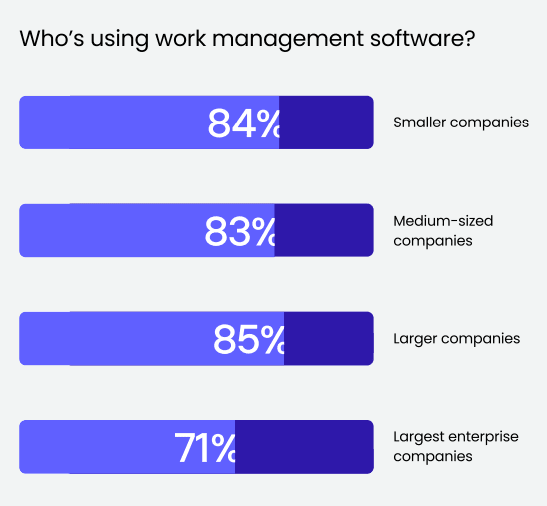
Project management salaries & career outlook
With a market of this size, it’s unsurprising that there are strong project management career opportunities. Depending on the company, project manager roles are often well-paid.
- The world currently has 40 million project management professionals, but up to 30 million more will be needed by 2035 to meet global demand (PMI, 2025)
- More than 426,229 project managers are currently employed in the United States (Zippia, 2025)
- The talent demand gap is largest in China, where it’s expected to reach up to 13.6 million by 2035 (PMI, 2025)
- The current project manager salary range is $104,000 to $183,000 per year (Glassdoor, 2025)
- The technology industry is the highest-paying for project managers (Zippia, 2025)
- The median total pay for a project manager salary is $136,000 (Glassdoor, 2025)
- A project manager’s total compensation package comprises a base pay range of $69,000 to $118,000 per year and additional pay of $35,000 to $65,000 per year (Glassdoor, 2025)
- 33% of professionals with a PMP certification report higher median salaries than those without the certification (PMI, 2025)
- Project manager employment is expected to increase by 7% from 2023 to 2033, more than average for all occupations (BLS, 2025)
- Over the next decade, around 77,000 job openings each year are expected to replace current workers who will switch careers or retire (BLS, 2025)
Training & skill gaps in project management
Project management professionals seek ways to strengthen their soft and technical skills by achieving recognized certifications. Many turn to the Project Management Professional (PMP) certification, which is widely considered the gold standard in the field.
- 1.58 million professionals are PMP-certified across 211 countries (HQ Hire, 2025)
- The top 10 countries with the highest number of PMP holders (HQ Hire, 2025):
-
- China: 36.62%
- United States: 26.53%
- Canada: 5.83%
- India: 4.55%
- Japan: 2.88%
- Saudi Arabia: 2.61%
- Germany: 1.19%
- United Arab Emirates: 1.15%
- Brazil: 1.01%
- Singapore: 0.98%
Despite the certification paths available, many project managers don’t have access to relevant development opportunities in their roles, and some lack training in essential project management collaboration tools, too.
- 45% of organizations provide accredited project management training (Wellingtone, 2024)
- 71% of companies believe employees need more project management skills, indicating a widespread competency gap (Wellingtone, 2024)
- 72% project success rates exist in organizations that prioritize soft skills, compared to 65% in those that don’t (PMI, 2023)
- 47% of project budgets are lost in organizations without a soft skills focus (PMI, 2023)
- 40% of projects experience scope creep in organizations lacking soft skills, compared to 28% of projects in soft-skill-focused companies (PMI, 2023)
- 78% of individual contributors feel comfortable using project or work management tools (monday.com, 2025)
These training gaps present a challenge and an opportunity. Companies that prioritize upskilling in their project teams — whether through certifications, internal training, or mentorship — will have a competitive advantage in delivering successful projects. Individually, too, professionals who invest in their development increase their earning potential and improve their ability to manage complex projects effectively.
Remote and hybrid project management trends
Thanks to the rise of digital project management tools and a willingness for companies to adopt remote and hybrid working strategies, many project managers now work flexibly. Yet, these project management statistics indicate how industry-specific requirements still dictate where and how projects are executed.
- 61% of project management professionals now work remotely at least some of the time. (PMI, 2024)
- 39% of project managers work in person for 5 or more days per week (PMI, 2024)
- 16% of project managers report that working in-person is an organization requirement rather than a personal preference (PMI, 2024)
- 63% of construction project managers and 51% of manufacturing project managers are most likely to work entirely in person (PMI, 2024)
- Only 3% of construction project managers and 10% of manufacturing project managers work in fully remote roles (PMI, 2024)
While McKinsey reports that 90% of companies have embraced some form of hybrid work, PMI’s statistics suggest that fewer project managers enjoy this flexibility.
Project management job title statistics
The question of “who” leads project management is complex. In some organizations, people take on project management responsibilities without holding a project manager title or having extensive project management skills. Other companies implement a formal project management office (PMO) to oversee project execution.
- Only 47% of projects are handled by a professional project manager (Wellingtone, 2024)
- Only 45% of organizations provide accredited project management training (Wellingtone, 2024)
- 82% of organizations now have at least one PMO (Wellingtone, 2024)
- A quarter of these PMOs are less than 2 years old as businesses experiment with or refine their project governance models (Wellingtone, 2024)
- 38% of organizations plan to increase their PMO investment this year, a significant drop from 57% the previous year (Wellingtone, 2024)
These shifting trends highlight that organizations may need time to reassess the effectiveness of their PMOs or shift toward more decentralized, Agile methodologies.
Project management goals and strategic objectives
As project management responsibilities expand, organizations recognize project management’s strategic value in driving business transformation. The following examples illustrate how companies use project management to shape the future of their businesses and stay competitive in their respective markets.
- 90% of organizations are now undergoing some type of digital transformation (McKinsey, 2024)
- 48% of organizations identify Environmental, Social, and Governance (ESG) projects as a top priority for their technology teams in the next 2 years (KPMG, 2023)
- 27% of organizations use project management to embed new technologies into their business models (PMI, 2024)
- 24% are introducing new revenue streams to diversify and grow (PMI, 2024)
- 12% must digitize their operating models for greater efficiency (PMI, 2024)
- 12% wish to transform existing products with digital features (PMI, 2024)
- 10% must boost organizational resilience to navigate uncertainty (PMI, 2024)
- 10% need to increase sustainability in their supply chains and products (PMI, 2024)
Project management proficiency
Despite the increasing reliance on project management to drive business transformation, many organizations still struggle with project execution, governance, and maturity. These project management statistics highlight key areas where project management proficiency remains a challenge.
- Only 52% of organizations “mostly” or “always” create a scoping document as part of their project planning (Wellingtone, 2024)
- Just 48% consistently baseline their project schedules, making it difficult to measure progress and adjust timelines effectively (Wellingtone, 2024)
- 64% of project managers “always” or “mostly” engage in risk management, leaving over a third of projects exposed to potential setbacks (Wellingtone, 2024)
- Only 37% of organizations are satisfied with their current level of project management maturity, while 45% express dissatisfaction, highlighting a significant gap in executional confidence (Wellingtone, 2024)
- 44% of workers have experienced multiple abandoned projects without explanation — a reflection of poor planning, misaligned priorities, and ineffective leadership (Resume Now, 2025)
Project management methodologies
As organizations work to improve project delivery and execution, they choose from predictive, Agile, or hybrid project management frameworks. Looking ahead, the shift toward more flexible project management frameworks is clear:
- 58% of organizations “mostly” or “always” apply a defined project management methodology (Wellingtone, 2024)
- 43.9% of organizations still rely on predictive approaches, such as the Waterfall model, though this has declined from 58% in 2020 (Wellingtone, 2024)
- 24.6% of companies now use Agile project management practices, such as Scrum, showing gradual growth from 23% in 2020 (Wellingtone, 2024)
- 31.5% of companies use a hybrid model combining predictive and Agile practices. This approach has increased from 20% in 2020 (Wellingtone, 2024)
- 73% of organizations expect to increase their use of hybrid project management practices over the next five years (Wellingtone, 2024)
- 34% anticipate decreasing their reliance on predictive models over the same period, signaling a move away from traditional, rigid structures (Wellingtone, 2024)
| Framework | Quick definition |
|---|---|
| Agile | A flexible, iterative approach to project management that emphasizes collaboration, customer feedback, and small, incremental changes |
| Waterfall | A linear, sequential approach where each phase (e.g., planning, design, development, testing) must be completed before moving to the next. Best for projects with well-defined requirements |
| Scrum | A subset of Agile that organizes work into time-boxed iterations called sprints, with roles like Scrum Master and Product Owner ensuring continuous progress |
| Hybrid | A combination of Agile and Waterfall methodologies, allowing teams to leverage the structure of Waterfall while incorporating Agile flexibility where needed |
| Predictive | A traditional project management approach that relies on detailed upfront planning and fixed schedules, typically used in industries like construction and manufacturing |
| Kanban | A visual workflow management method that uses a board to track tasks through different stages, promoting continuous delivery and minimizing bottlenecks |
| Lean | A methodology focused on reducing waste, optimizing efficiency, and delivering maximum value with minimal resources. Often used in manufacturing and software development |
| Extreme Programming (XP) | An Agile framework emphasizing high-quality software through practices like test-driven development, pair programming, and continuous integration |
| PRINCE2 | A structured, process-driven project management methodology commonly used in government and large organizations, with a focus on predefined roles and responsibilities |
Project management statistics by industry
Although Agile and hybrid methods continue to gain traction, some industries remain committed to predictive models due to their need for detailed planning, compliance, and long-term project timelines.
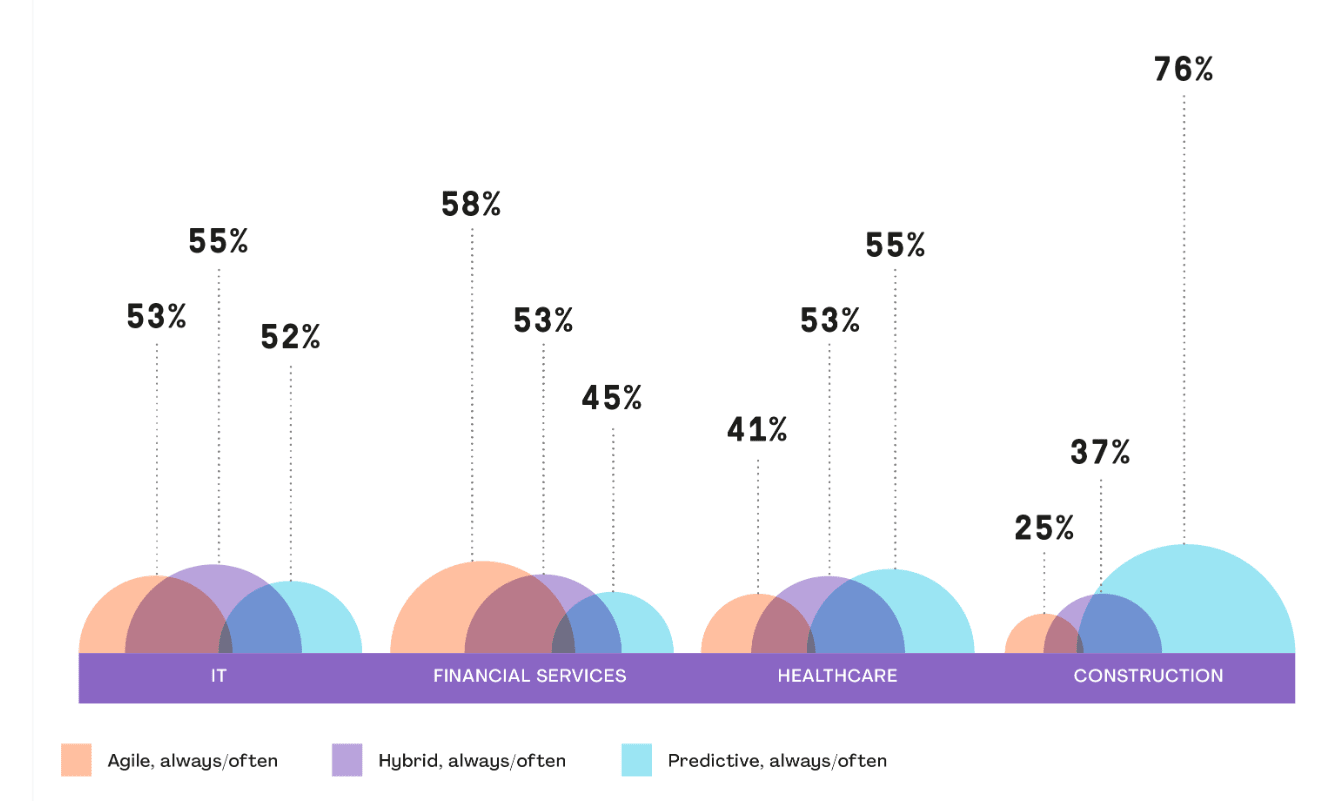
(Image source: PMI)
Agile is dominant in financial services companies
- 58% of financial services companies report using Agile methods regularly, making them the most likely industry to adopt Agile approaches (PMI, 2024)
- Only 45% of financial services firms still use predictive methods, reflecting a clear shift toward faster, customer-driven development cycles (PMI, 2024)
- Agile adoption in this sector is driven by the need for rapid regulatory adaptation, fintech innovation, and continuous product iteration (PMI, 2024)
Predictive models are essential for construction companies
- 76% of construction companies still rely on predictive project management, the highest among all industries (PMI, 2024)
- Only 27% of construction teams use Agile approaches, as sequential planning, safety regulations, and compliance requirements make iterative work difficult (PMI, 2024)
- 37% incorporate hybrid approaches, allowing some flexibility while maintaining strict project budgets and timeline controls (PMI, 2024)
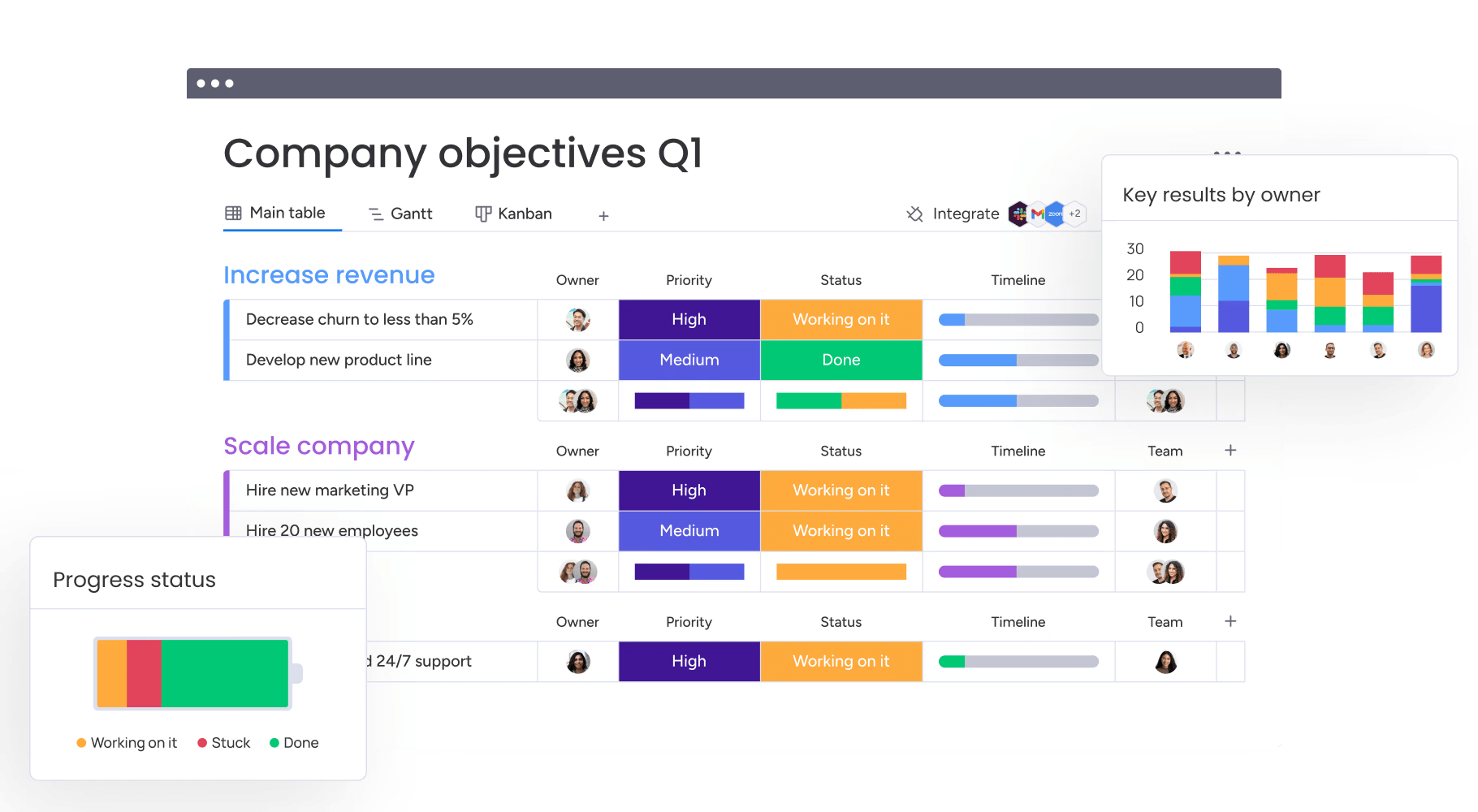
monday work management company objectives board
Regardless of whether teams follow a predictive, Agile, or hybrid approach, they need a flexible, scalable platform that adapts to their way of working. With customizable workflows, automation, and real-time visibility, monday work management is a unified platform that enables organizations to seamlessly integrate their preferred project management approach while maintaining alignment across teams, departments, and strategic goals.
Get StartedProject management success and failure statistics
For all the tools, methodologies, and expertise available, one uncomfortable truth remains: Many organizations still struggle to track project success rates and achieve positive business outcomes.
- 47% of organizations lack access to real-time KPIs (Wellingtone, 2024)
- 34% of organizations “mostly” or “always” complete projects on budget (Wellingtone, 2024)
- 34% manage to deliver projects on time (Wellingtone, 2024)
- 36% fully realize the benefits their projects were designed to achieve (Wellingtone, 2024)
- 73.8% is the average project performance rate (PMI, 2024)
Part of the problem is undoubtedly knowing what project success means and how to achieve it. The great news: Employees who do understand how success is measured are 2x more likely to feel motivated to achieve these results.

“monday.com has been a life-changer. It gives us transparency, accountability, and a centralized place to manage projects across the globe".
Kendra Seier | Project Manager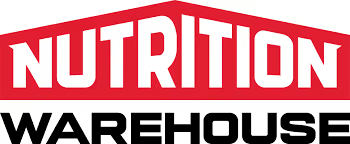
“monday.com is the link that holds our business together — connecting our support office and stores with the visibility to move fast, stay consistent, and understand the impact on revenue.”
Duncan McHugh | Chief Operations OfficerAI in project management software
Project management software has already become a staple for teams looking to improve collaboration, workflow automation, and real-time reporting. And now, tools like monday work management, that come equipped with built-in artificial intelligence capabilities, make it easier to achieve future success.
AI in project management is projected to grow from $3.08 billion in 2024 to $3.58 billion in 2025, with a CAGR of 16.3%. By 2029, the market is expected to reach $7.4 billion with a CAGR of 19.9%.
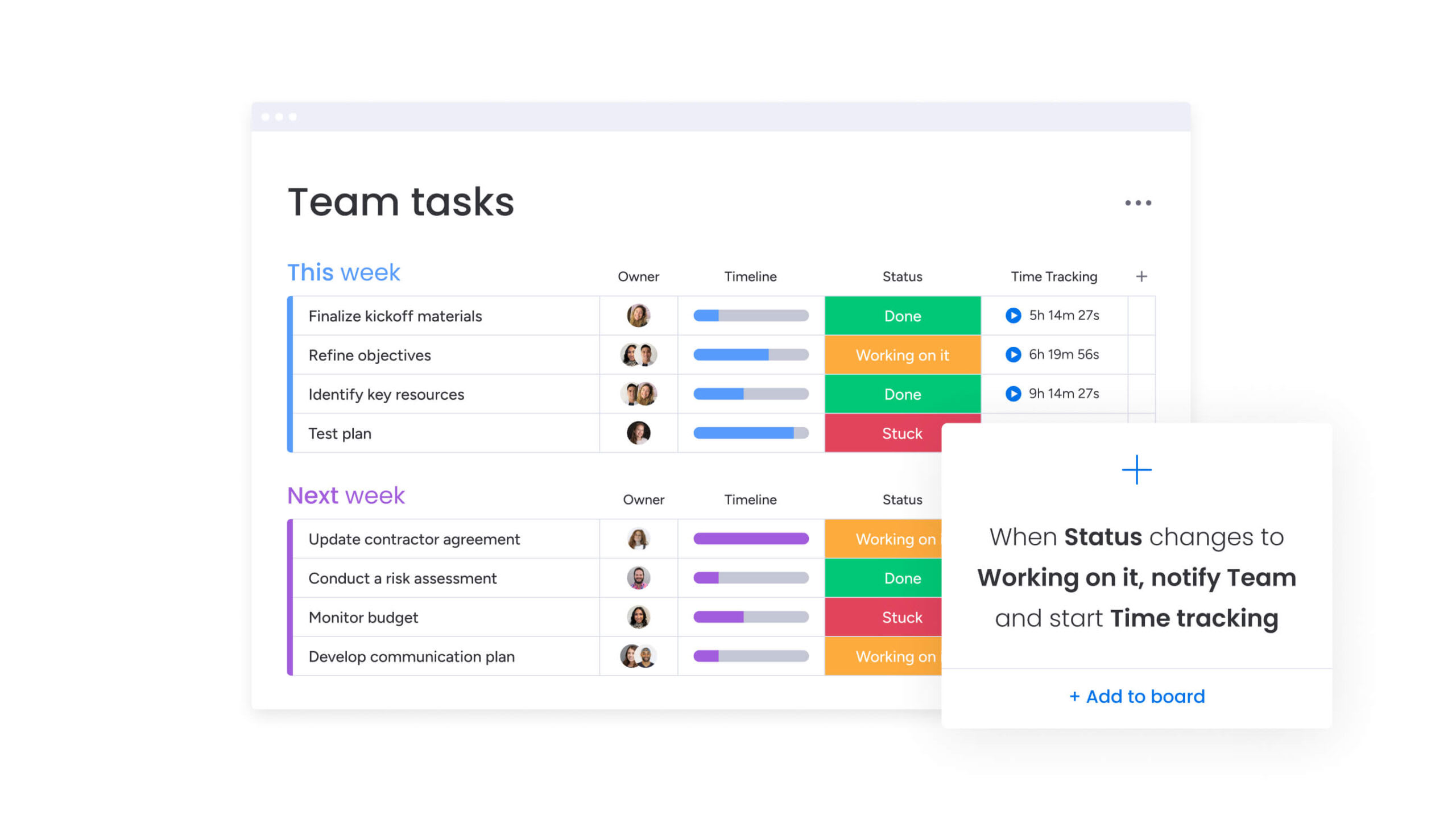
As companies seek to reduce inefficiencies, improve real-time decision-making, and minimize the administrative burden on project teams, this has prompted a major AI boom in the project management market.
- 21% of project managers say they are using AI always or often in the management of projects (PMI, 2023)
- 82% of senior leaders say AI will have at least some impact on how projects are run at their organization over the next five years (PMI, 2023)
- 91% of project managers believe AI will have at least a moderate impact on the profession, and 58% say it will have a “major” or “transformative” impact (PMI, 2023)
- 1 in 5 project professionals now uses generative AI in over 50% of their recent projects for managing project work (PMI, 2024)
Assaf Elovic, Head of AI at monday.com, believes that Gen Z’s deep familiarity with technology makes them more discerning about AI’s capabilities. Unlike earlier generations, Gen Z is less impressed by AI’s promises and may be more skeptical of its real-world benefits in project management.
Beyond adoption rates, concerns about AI’s impact on job security also vary by generation, with adoption rates of 65% for Gen Xers, 73% for millennials, and 59% for Gen Zers, according to monday.com’s world of work report.
- 30% of professionals across all age groups worry AI could threaten their jobs (monday.com, 2025)
- 42% of Gen Z is particularly concerned about AI automating the aspects of their work they enjoy most, raising questions about how AI should be integrated without diminishing employee engagement and satisfaction (monday.com, 2025)
- 80% of millennials believe AI can help them do their jobs better (monday.com, 2025)
- 49% of millennials are “very open” to AI adoption (monday.com, 2025)
Demographics in the project management space
The following statistics highlight key insights that shed light on disparities, progress, and areas for improvement in the project management profession.
- 37% of women have an academic degree in project management versus 42% of men (PMI, 2023)
- 72% of women hold a project management certification versus 76% of men (PMI, 2023)
- 57% of women have a PMP certification compared to 64% of men (PMI, 2023)
- 5% of women have a CAPM certification versus 2% of men (PMI, 2023)
- 9.8 years is the average length women have worked in project management compared to 11.4 years for men (PMI, 2023)
- Women are more likely to work full-time for an organization (+5.7%) and less likely to be a consultant/contractor (-4.6%) (PMI, 2023)
- Women are more likely to work in an organization with a departmental PMO (+1.7%) or both departmental and enterprise PMOs (+4.2%), while men are more likely to work in an enterprise PMO-only setting (-6.0%) (PMI, 2023)
- Leadership positions are held by 20% of women versus 23% of men, including roles such as PMO director, portfolio manager, or other management positions (PMI, 2023)
The future of project management and the world of work report
Project management is evolving — becoming more integrated, strategic, and technology-driven. The increase in smarter, AI-driven workflows and continuous cross-department tracking has reshaped how teams manage projects. Wellingtone’s research finds that 62% of organizations anticipate an increase in project work, while 53% expect to shift toward working in smaller, more agile teams.
To stay ahead, organizations must embrace the latest trends, methodologies, and technologies shaping the industry. Download the monday.com world of work report to gain data-driven insights into how businesses are adapting to new challenges and transforming their project management strategies for long-term success.
Get StartedDon’t miss more quality content!
